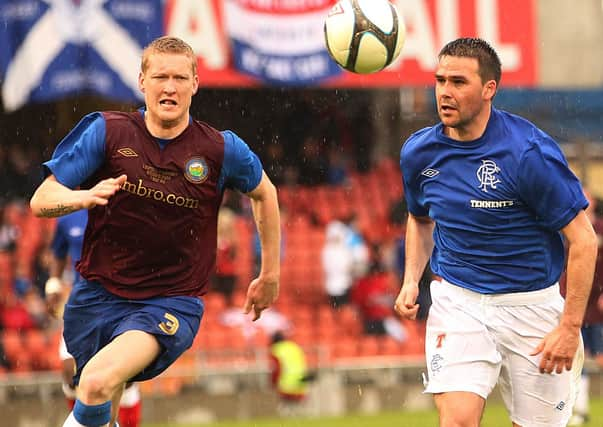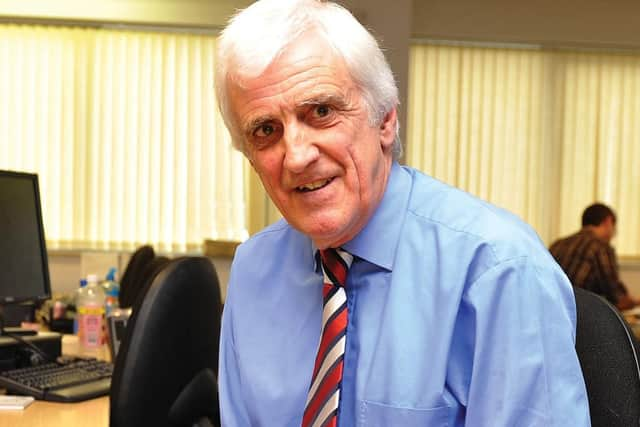Darkest days that served to strengthen the bond between Gers and NI


A severe financial crisis left Rangers in a most difficult situation and rival clubs and the game’s legislative bodies in Scotland moved speedily to exert harsh punishment for what were perceived serious irregularities in administration.
Rangers lost their senior status and were relegated to the lowest division of the Scottish League. For those who envied and reviled the enormous success of the club over a century and more, the humiliation brought comfort and, regrettably, much gloating.
Advertisement
Hide AdAdvertisement
Hide AdRangers’ supporters - a global brand that exudes pride on all that the club has achieved - were undeterred and the flame of ‘Onwards and Upwards’ was lit for a gradual process that would culminate in a return to where they belong - at the pinnacle of Scottish football. A club back in its rightful place.


That process gloriously came to fruition last weekend for a Rangers squad managed by the impressive Steven Gerrard and inspired by the skills of proud Northern Ireland captain Steven Davis as they joyously won the Scottish Premiership for a world-record 55th time.
Rangers’ return to the top trod a rocky road, but the fan base was undiminished with 50,000 incredibly packing Ibrox stadium for home games against the lesser lights of Scottish football.
In Northern Ireland, Rangers’ fans rallied to the cause and supporters’ clubs across the province, of which number 60 today, enthusiastically joined the crusade to restore the financial fortunes of the parent club. Legendary Rangers and Scotland full-back, the late Sandy Jardine, was appointed by the club to liaise with the supporters - his role was to administer a fans’ fighting fund.
Advertisement
Hide AdAdvertisement
Hide AdSandy, capped 37 times by his country, was personally upset by the sanctions imposed by the Scottish Football Association and in April 2012 he famously led a march of 8,000 Rangers fans to the SFA headquarters at Hampden Park to protest.
Edinburgh man Sandy, who sadly died in April 2014, also made regular trips to Belfast to meet the supporters here and he emotionally addressed a packed meeting of fan clubs from across the province at the Harland and Welders club in east Belfast. The club was packed to the rafters that night and the rallying cry resulted in large amounts being donated from all parts of Northern Ireland over the subsequent period.
I attended, invited in my role as vice-chairman and director of Linfield - a club with long and very strong ties with the Glasgow Rangers - and also as a fervent fan.
That night the concept was raised of Rangers coming over to play Linfield at Windsor Park for a game where the proceeds would go to the Ibrox ‘fighting fund’. A week later, the Linfield board unanimously backed the move and Rangers, managed by Ally McCoist and with Ulstermen Stevie Davis, Kyle Lafferty, David Healy and Andrew Little in the ranks, fulfilled the fixture on May Day, 2012. Rangers won 2-0 but the result was academic - the ‘Blues’ Brothers’ had renewed friendships on the field and a substantial amount of money - running well into six figures - helped boost the Ibrox appeal. Sizeable donations also came in from all parts of Northern Ireland over the subsequent period.
Advertisement
Hide AdAdvertisement
Hide AdIn the Windsor Park boardroom, Sandy, in the company of other Rangers officials, invited Linfield back to Glasgow for a return fixture, reciprocal for the warmth and generosity expressed that day. In 2013, Linfield played their first-ever game at Ibrox, with Rangers winning 2-0.
The fund-raising game at Windsor Park was also warmly acknowledged by Rangers directors, then and since, who said that when the various clubs in Scotland were turning their backs on Rangers, Linfield was the only one to come forward with tangible and genuine support.
Dual loyalties are not uncommon in football and, provided the interests do not compete within the same jurisdiction, it is quite acceptable to be attracted to two different clubs, albeit in different countries.
I have been a lifelong Linfield supporter and board member for 45 years. However, I also have a genuine and abiding interest in Glasgow Rangers Football Club which can be traced back 60 years when I first entered the portals of Ibrox in 1961.
Advertisement
Hide AdAdvertisement
Hide AdThe Rangers team I can best associate with from that period was: Ritchie, Shearer, Caldow, Davis McKinnon, Baxter (‘Slim Jim’), Henderson, McMillan, Millar, Brand and Wilson.
Rangers’ Ulster connection can be traced back to the formation of the club, when brothers Moses and Peter McNeil pioneered their entry into Scottish football in 1872. The mother of the McNeil brothers was Jean Bain, from Bellshill near Crossgar, Co Down.
A total of 35 players with an Ulster/Irish connection have played for Rangers since the club’s foundation. Three have captained the club - Bertie Masterrson, John McClelland and Steven Davis - and Jimmy Nicholl had a spell as assistant manager. Six players with an Ulster connection are in the Rangers ‘Hall of Fame’ - Moses McNeil, Peter McNeil, Bertie Manderson, Sam English, Billy Simpson and Derek Parlane (his mother came from Bangor).
Whatever the modern global image of the new Scottish Premiership champions, Glasgow Rangers has always been a family club.
Advertisement
Hide AdAdvertisement
Hide AdToday, the Rangers playing squad happily provides a rich cosmopolitan mix, with player recruitment now extended from across the UK to various countries and continents. The Rangers brand is now happily dominant and successful again in Scotland and also making a very impressive footprint in European football.
q BILLY KENNEDY is author of Rangers Football Club - the Ulster Connection (published 2019), available in hardback (£14.99) and softback (£9.99) at Rangers superstores in Glasgow and Belfast and online with Amazon.